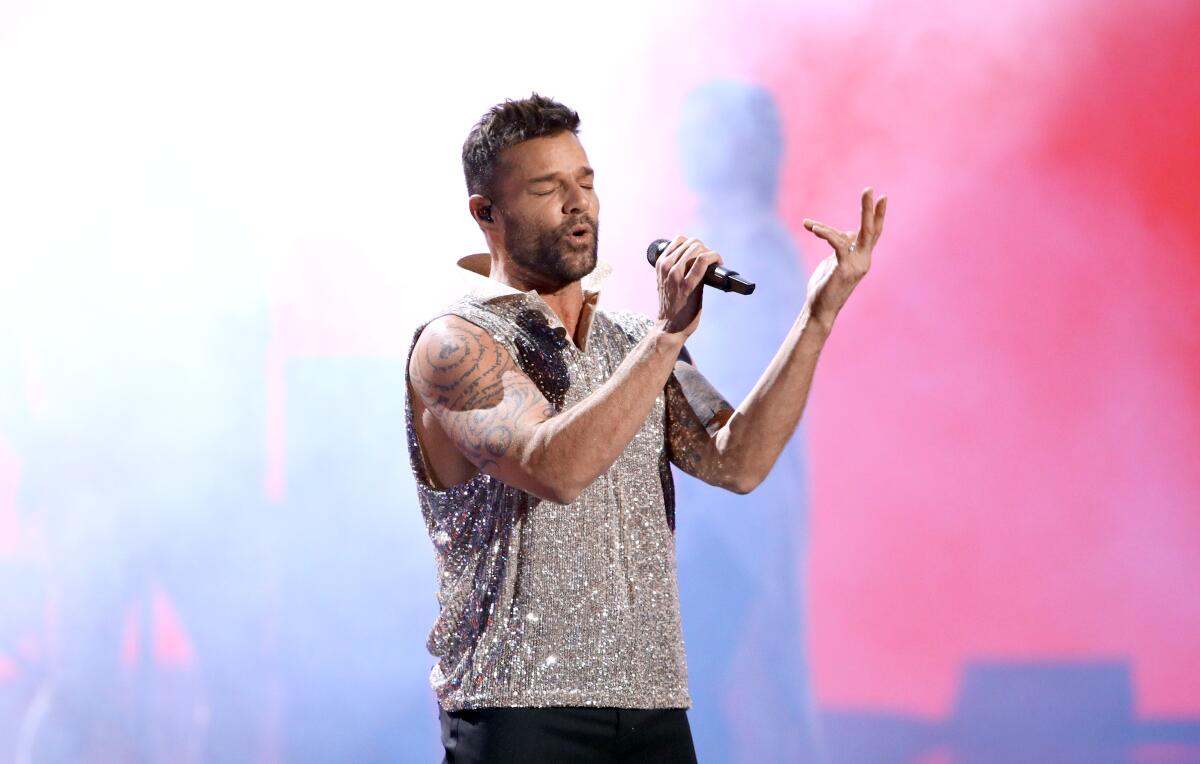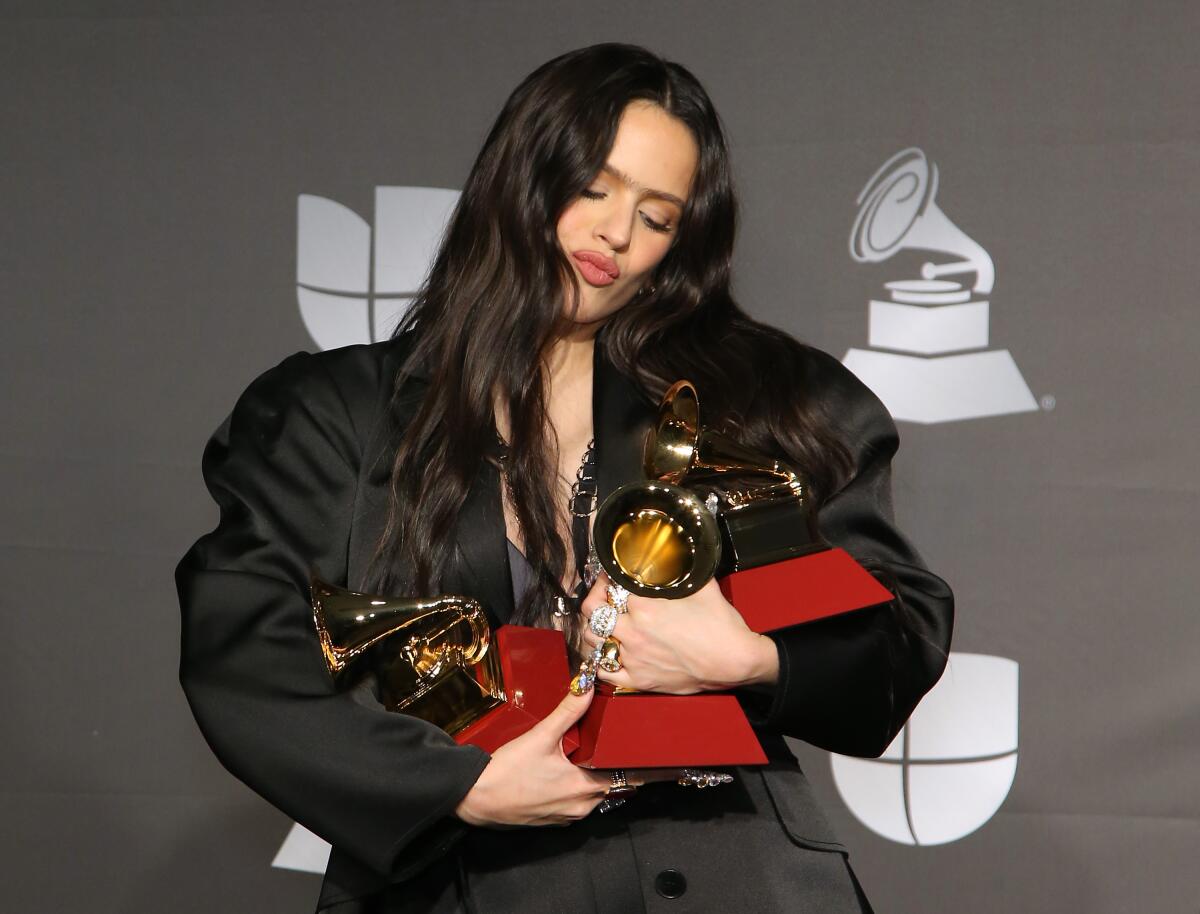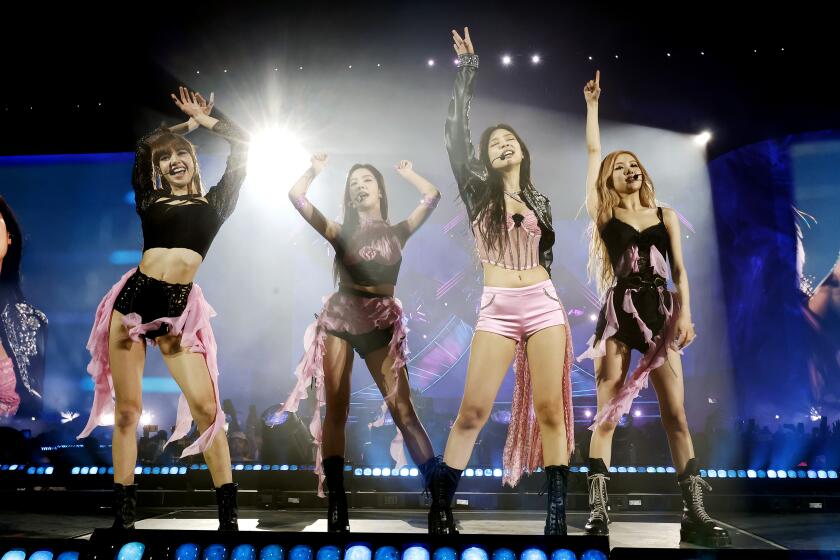Latin Grammys 2019: Rosalía makes history, Bad Bunny addresses reggaeton snubs

- Share via
LAS VEGAS — Latin urban acts may have felt the sting of neglect with not one reggaeton act receiving a nomination in the major categories for this year’s Latin Grammy Awards. But while two of music’s biggest stars, Daddy Yankee and J Balvin, stayed home as a form of protest, many of the genre’s globally recognized performers simply did what they do best: showcased their work for a worldwide audience live from the MGM Grand Arena in Las Vegas.
Leading the pack of winners Thursday night was Spain’s Rosalía: The flamenco-trap singer, songwriter and actress won three Grammys for album of the year, urban song and contemporary pop album for “El Mal Querer,” which also earned the Spanish singer’s team two additional awards for recording package and engineered album. From the stage, she thanked the absent Balvin, with whom she shared the Latin Grammy in the urban song category for “Con Altura.”
Another Spanish act, Alejandro Sanz, who had the most nominations with a total of eight, took home three Grammys, for record of the year, long-form music video and pop song for “Mi Persona Favorita,” a prize he shared with Camila Cabello. But it was Rosalía’s rise in music with strong vocals, uber-creative visuals and a charming personality that has captured a new generation of fans as well as music industry veterans. With her album of the year win, she became the first woman since Shakira in 2006 to break the category’s glass ceiling as a solo female artist.
“It was more of a year of hard work,” Rosalía said backstage, addressing the press. “When I made that album I made it from the heart. I didn’t think about what would happen later. I can’t control anything that happens after the creative process because after that it’s not yours anymore, it’s everyone else’s.”

Moments later, Sanz also spoke to the media and simply said he felt elated that after all these years, he’s still a contender. “I feel like a thief,” the Spanish crooner said, referring to a career of constant wins.
Ricky Martin opened the 20th annual awards show in a sleek white and black tuxedo with swirl patterns. But it was an all-star group of recording acts, including Olga Tanon, Anitta and Calibre 50, among others, who performed songs from three of the biggest entertainers who left undeniable legacies: Celia Cruz, Juan Gabriel and Joan Sebastian.
The opening set featured a diverse ensemble of stars who helped jump-start the show, including Milly Quezada, Carlos Rivera, Reik and Natalia Jimenez. Draco Rosa, who earlier in the night during the pretelecast known as the Premiere won for best rock album, also performed in the opener with Fito Paez and Beto Cuevas, performing Sebastian’s “Secreto de Amor.”
Bad Bunny won for urban album of the year for “X 100Pre” and made it clear in his acceptance speech that the perceived Latin Grammy reggaeton snubs are only going to trigger more energy in the Latin urban community.
Addressing his onstage remarks to “all musicians” and Recording Academy members, he said: “With all due respect, reggaeton is part of Latin culture and is representing as much as any other genre worldwide. To my fellow reggaetoneros: Keep giving it your all and we will continue to bring creativity and ingenuity. Our genre has become views, numbers, and let’s keep going and giving people new things.
“Reggaeton is part of the culture,” the Puerto Rican rapper said. “We are going to keep working on this and let’s bring back the creativity and humanity. Let’s bring different things for the people.”
Rosalía delivered one of the night’s most compelling performances. Wearing a cherry-red outfit topped with a white belt and bow, she performed a medley of her songs, including “Con Altura,” which she co-wrote with Balvin and her longtime Spanish producer El Guincho.
Puerto Rico’s Pedro Capó’s “Calma” won for song of the year along with Gabriel Edgar González Pérez and George Noriega. He dedicated the song to his children and his late brother, who inspired the song.
During the telecast, three generations of the Fernandezes performed — Vicente, Alejandro and Alex — along with Mariachi Sol de Mexico. Alex opened with “Te Amare,” followed by Alejandro performing “Caballero” and Vicente, the patriarch of the Fernandez musical dynasty, appearing onstage to sing “Volver, Volver,” commanding a standing ovation, before being joined by his son and grandson.
Backstage in the media center, the volume on the TV monitors was lowered for a separate interview, but the majority of the media objected and demanded that the TV remain at full volume. Onstage, the patriarch and his brood stood together as an extended standing ovation continued before Martin approached Vicente to give him the presidential award, a special Latin Grammy recognition that also was given during the telecast to Mexican singer Thalia.
“Time is limited at these [TV] things,” Vicente jokingly told the audience. “I want to thank all those radio people who believed in this man and all those people who have listened through the years. You live in here [pointing to his heart] until the day I die.”
The best new artist award went to soulful singer Nella, a Berklee College of Music graduate who was nominated in the category with nine others. Nella’s Venezuelan roots have modern influences in addition to folklore sounds.
Similar to previous years, the Latin Grammy producers gave a nod to a crossover theme with a performance from a non-Latin artist. Alicia Keys joined Capó, Miguel and Farruko for a medley of songs that included “Show Me Your Love” and “Calma.”
Juanes, this year’s person of the year, performed some of his biggest hits during the telecast, first appearing alone on a darkened stage before being joined by Alessia Cara and Sebastian Yatra. The trio performed “Fijate Bien,” “Querer Mejor,” “A Dios le Pido,” “Bonita” and “La Camisa Negra.”
One of the biggest surprises of the night was the arrival of Metallica’s Lars Ulrich, who appeared onstage to give Juanes his person of the year tribute.
“Tonight we come full circle,” Ulrich said. “I proclaim myself a Juanes fan. My brother in rock, mi amigo, mi parcero, I am proud to recognize you as the Latin recording artist of the year.”
Juanes, taken aback by Ulrich’s arrival, made it clear that Metallica influenced him greatly and was one of the reasons he wanted to be a recording artist.
“I made music because of you ... 30 years ago,” Juanes said. “My heart is full of love. Colombia, without you I’m nothing. I love you all.”
In an interview with The Times in Las Vegas this week, the Colombian recording artist spoke about his early days when he had little money in his pockets, couch-surfed in L.A. to survive and relied on one woman in particular during those tough times.
“My mom had so much faith in me,” Juanes said. “She would tell me to be patient and that got me through. I remember being in L.A. with a motorcycle and computer, but I sold them and eventually saved $4,000 to get to the next phase. Through pain and patience I learned that things work out.”
Homage to Puerto Rico was also a pivotal arc in this year’s Latin Grammys, with a performance of “Cántalo” by Martin, who was joined by Residente and Bad Bunny.
Young regional Mexican star Christian Nodal took home the best ranchera/mariachi album for “Ahora.”
Latin urban superstar Ozuna gave an electrifying performance, opening his set wearing a dark cape at the piano and then, as the stage opened up, going into a colorful aquatic/sea theme.
As far as the Latin urban controversy, Juanes said it may be time for both the Latin Grammy organization and urban artists to look at how they can improve future nominations.
“It’s important for both the Latin Grammys and reggaeton artists to see what they can do better in the future,” Juanes said. “It’s not a good or bad thing. It’s something that happened, but connecting is key.”
More to Read
The biggest entertainment stories
Get our big stories about Hollywood, film, television, music, arts, culture and more right in your inbox as soon as they publish.
You may occasionally receive promotional content from the Los Angeles Times.










